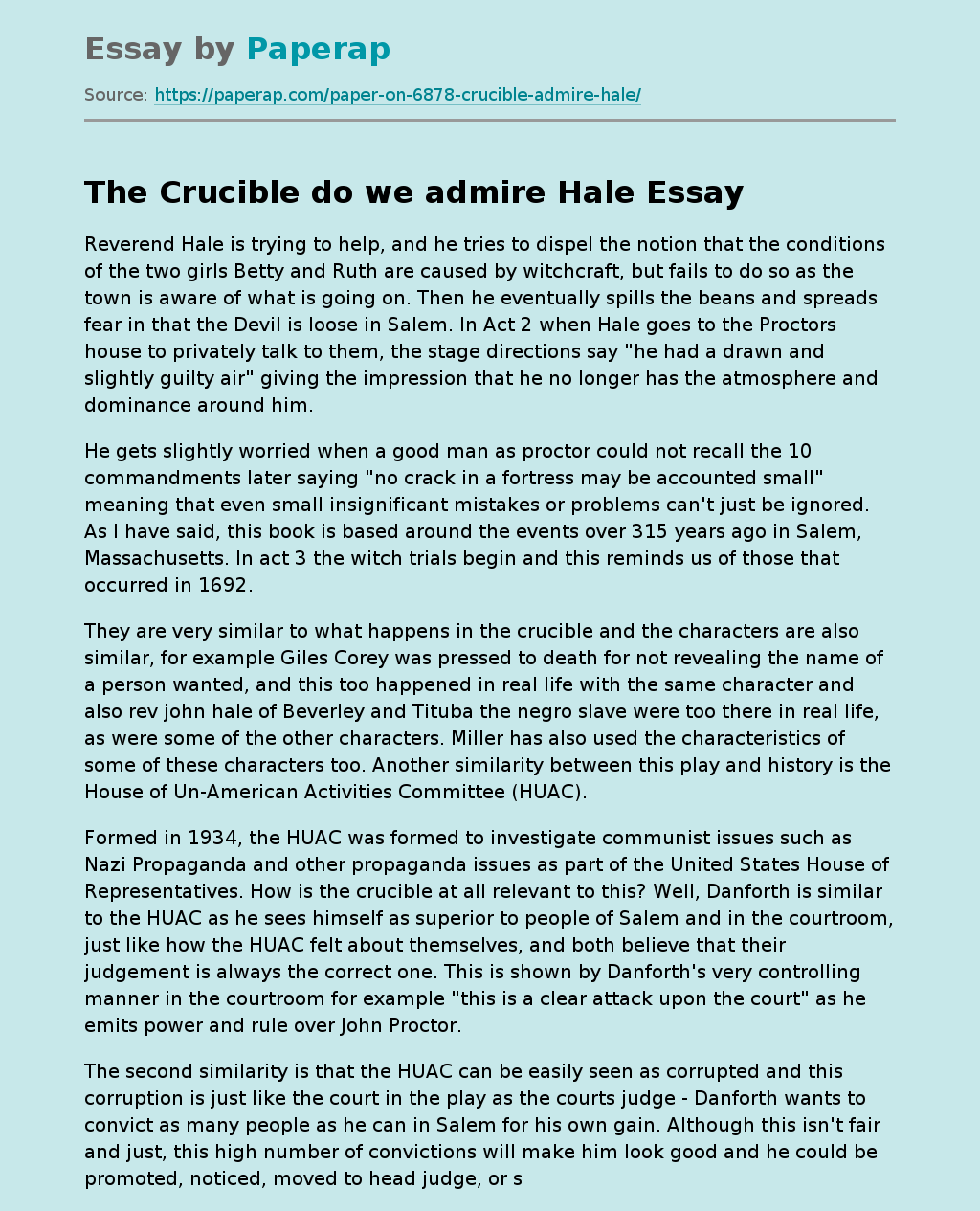The Crucible do we admire Hale
The following sample essay on Reverend Hale is trying to help, and he tries to dispel the notion that the conditions of the two girls Betty and Ruth are caused by witchcraft, but fails to do so as the town is aware of what is going on. Then he eventually spills the beans and spreads fear in that the Devil is loose in Salem. In Act 2 when Hale goes to the Proctors house to privately talk to them, the stage directions say “he had a drawn and slightly guilty air” giving the impression that he no longer has the atmosphere and dominance around him.
He gets slightly worried when a good man as proctor could not recall the 10 commandments later saying “no crack in a fortress may be accounted small” meaning that even small insignificant mistakes or problems can’t just be ignored. As I have said, this book is based around the events over 315 years ago in Salem, Massachusetts. In act 3 the witch trials begin and this reminds us of those that occurred in 1692.
They are very similar to what happens in the crucible and the characters are also similar, for example Giles Corey was pressed to death for not revealing the name of a person wanted, and this too happened in real life with the same character and also rev john hale of Beverley and Tituba the negro slave were too there in real life, as were some of the other characters. Miller has also used the characteristics of some of these characters too.
Another similarity between this play and history is the House of Un-American Activities Committee. Formed in 1934, the HUAC was formed to investigate communist issues such as Nazi Propaganda and other propaganda issues as part of the United States House of Representatives. How is the crucible at all relevant to this? Well, Danforth is similar to the HUAC as he sees himself as superior to people of Salem and in the courtroom, just like how the HUAC felt about themselves, and both believe that their judgement is always the correct one. This is shown by Danforth’s very controlling manner in the courtroom for example “this is a clear attack upon the court” as he emits power and rule over John Proctor. The second similarity is that the HUAC can be easily seen as corrupted and this corruption is just like the court in the play as the courts judge – Danforth wants to convict as many people as he can in Salem for his own gain. Although this isn’t fair and just, this high number of convictions will make him look good and he could be promoted, noticed, moved to head judge, or something of a similar field. An example of this is when Danforth says “do you know that near to four hundred are in the jails from Marblehead to Lynn, and upon my signature?
” Here he is being self admiring and trying to show off how good a judge he thinks he is and also shows that he is very proud that he has jailed so many people. In act 3 and 4, we realize how selfish Parris can be. At every opportunity possible, he accuses and disputes any people who may pose a threat to him and his position in the town and the church. Even in the courtroom Parris displays this sort of behaviour calling out that attacks are being made on the court and tries to create a bias feeling towards people in a negative manner. However, into act 4 Hale does the opposite and goes against the court to try and help bring justice. Now we really admire Hale and despise Parris even more. He is trying to help Proctor now as he is a truthful man and knows that proctor is innocent. He wants justice to come out of the case and wants proctor to sign the confession so that he will live. In act 4, Parris realises what he is doing is wrong, and begins to change. Like Hale, be begins to turn to the side of the accused, and wants proctor to live. However, this is no act of kindness, this change comes about as the mood of the town worsens and focuses on him.
So, he is doing it for the good of himself and he realises that if Proctor was to be hung, he could lose his position as minister and even be thrown out of Salem. This makes us despise Parris further. However, if it were for the reason that he has turned to a kind and truthful man who wanted to stop it from happening we would admire him. Another thing to despise Parris is the very pathetic and selfish action at the end of act 4 before Proctor is to be hung, where Parris offers him some cider; “If you desire a cup of cider, Mr Proctor, I am sure I-“. He does not finish as he sees Proctor giving him an icy stare. To do this, especially when you are the man who is responsible for his hanging, is just outrageous! Parris, throughout the play, can only be described as selfish, heartless, small minded and self motivated – a sort of man who no one would want to know or associate with, and especially for someone like this to be a Minister! Despisable. Rev Hale, throughout the play, has feelings for people and only wants to help and do the right thing. He knows what’s right and wrong and unlike Parris, does what is right for other people and not what’s best for him. A man you would want to know, a man with the true personality of a Reverend, admirable.
The Crucible do we admire Hale. (2017, Oct 13). Retrieved from https://paperap.com/paper-on-6878-crucible-admire-hale/

